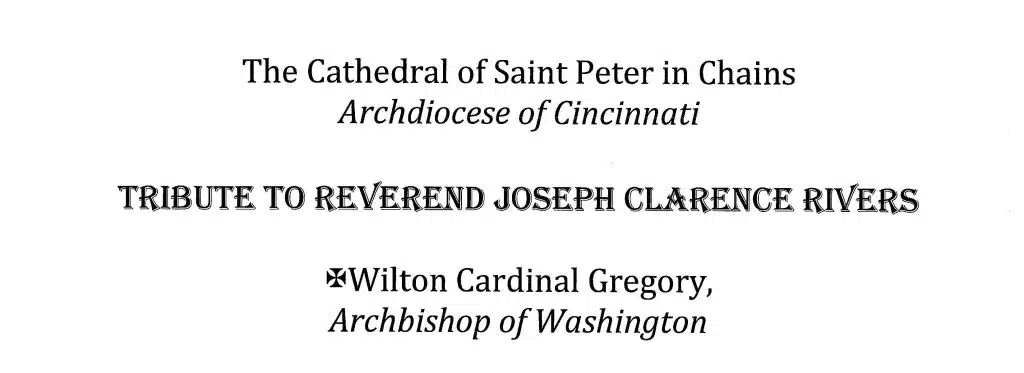Cardinal Gregory homily for the Solemnity of Jesus Christ, King of the Universe; and the 20th Anniversary of Fr. Rivers’ Death.
Archbishop Schnurr, beloved members of the Family of Faith of the Archdiocese of Cincinnati, Friends all in Christ,
I am deeply grateful for the invitation to share in this Eucharist that acknowledges and gives thanks for the multi-talented gifts of one of your most well-known priests, Father Joseph Clarence Rivers. For those of you who knew him personally, perhaps especially members of his own beloved family, you know that Clarence would have considered the Solemn Feast of Christ the Universal King, perchance the only truly appropriate liturgical occasion on which to pay him tribute. Clarence added great luster to this revered Archdiocese by sharing his multi-talented liturgical and artistic gifts to the worship life of the Catholic Church throughout America. He did so as a man of Color, as a priest of Jesus Christ and as a proud member of the Presbyterate of Cincinnati.
Are you the king of the Jews? Pilate’s gospel question in our liturgy was addressed to a man who was then under arrest, and the question would have seemed at best rather strange. Kings are not as a rule those who are taken under arrest, unless of course there happens to be a revolution in progress. Charles I of England, Louis XVI of France and Czar Nicholas II of Russia were all kings who were overthrown and ultimately put to death when their subjects decided to cast off the royal mantle for a new form of government. Revolutions are social actions that sometimes throughout history result in the bloody deaths of those who may have been kings at the time.
However, Jesus, the man who was in custody, had never known the type of luxurious royal life-style that the kings of the earth usually have been known to live. He was the Shepherd King spoken of repeatedly by the prophets. His beginning was hardly that of royalty but rather one of abject poverty. His life was spent as an itinerant rabbi – at times lacking even a place in which to lay His head. He was a poor man and never one identified with the wealth and privilege and trappings of royalty.
Our little ones usually have quite charming images of kings and queen, princes and princesses. They remember kings and queens from fairytale stories and not those caught up in revolutions. They remember kings like Prince Charming who could wake sleeping beauties with a kiss, or the prince who anxiously sought after his princess clutching only a glass slipper as a clue. These members of royal families sought their precious ones out of love and made them regal because they cherished them so deeply. Children’s imaginations are charming, but so unreal.
Nonetheless, there was something about this Poor Man Jesus in today’s Gospel that obviously conveyed royalty – so much so that the religious leaders at the time felt that it was absolutely necessary to crush any claim of His kingship although from His mere appearance one would hardly suspect that He was and is in fact a king! Pilate would later exclaim subsequently following that initial question – after Pilate had arranged to have Jesus beaten by the palace guards: look at the Man – broken and scourged to the point of near death!
The essence of the Kingship of Jesus Christ has nothing to do with crowns and scepters or ceremonial robes. He is a King most perfectly because He governs and frees His people. Unlike those kings who were put to death under the pretense that their deaths were somehow directly related to the freedom of their people, Christ freely embraced a death that was perfectly liberating for all those who have ever lived. He freely endured a death that has made all of us – you and me even to this day – truly free if we so choose to accept the gift of His life and love.
Kings usually reign from thrones. Christ instead reigns from the Cross. All kings wear crowns – Christ’s was woven from thorns. Kings have raiment that is fashioned from the finest cloth; Christ had his cloak striped from him with a roll of dice. There was nothing about this King that corresponds to the conventional pattern of royalty – except that his death rendered people absolutely free.
This feast is about a King who embraces death for the sake of salvation for His people. Pilate’s opening question that appears odd at the moment is really an insight that even he failed to grasp. Yes, Jesus Christ is a King, but one unlike any king that has ever lived. Moreover, Jesus’ kingdom is not limited by territory or time. He is the King of the ages as the Book of Revelation proclaims in the second reading.
The revolutions that cast down the kings of nations held up the hope that with the death of a monarch, the people might truly be free. With the death of Jesus, all of creation was set free to become what God had designed it to be – free from bloodshed, hatred, violence, deceit, and sin. With Jesus’ death, death itself was destroyed and conquered. Yes, Pilate, Jesus is a king and all those who choose to honor Him as a King belong to a Kingdom that will be established in truth and justice. We know that to be true because even now 2,000 years later, we see His royal qualities even through His suffering and death and we know ourselves to be truly free because of His Resurrection from the death He endured for us all. We share in His royalty because He loves us – so maybe our kids’ ideas of kings and queens just might be right after all.
Clarence Rivers was also a paradoxical individual – a physically diminutive man who was just bursting with enormous musical and artistic genius. Our Church has been immensely enriched through the talents of that Cincinnati priest. He began his ministry at a moment in time when there were not very many places, in this local Church or elsewhere, that would have happily accepted a Priest of Color – even one with such talents and skills. Clarence offered his musical and artistic gifts to audiences that with time had to grow comfortable with the magnitude of the offering – as we have over these years. He composed music distinctively designed for Catholic worship in the style, rhythm and cadence of the songs of African-Americans. His art was a splendid reflection of our African cultures. Today, on this Solemn Feast of Jesus Christ the King, the Archdiocese of Cincinnati proudly claims Clarence as one of their own. And I know that he would be overcome with pride and joy to welcome that honor.














